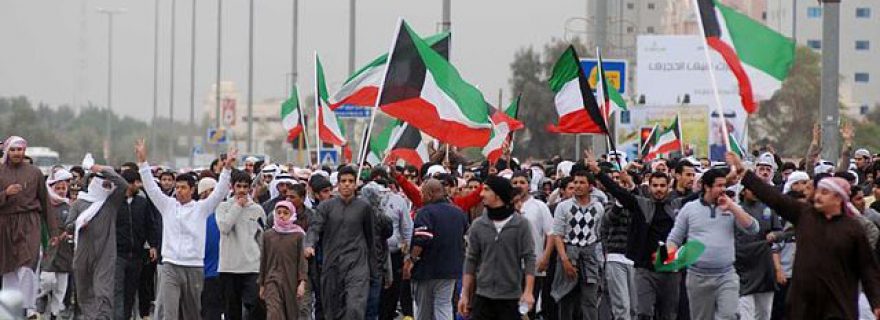Unrest in the region: Kuwait’s security debate in light of the Arab Spring and the rise of IS
How do recent developments in the Middle East influence Kuwait’s stand on the long awaited ratification of the GCC (Gulf Cooperation Council) Security Pact? Brigitte van de Pas analyses.
The Arab Spring has not bypassed the Gulf. Although not as vocal and violent as in Bahrain, all Gulf Cooperation Council (GCC) member states have faced protests, culminating in the storming of parliament in November 2011 in the case of Kuwait. Throughout 2011 there have been small-scale protests, calling for rights for Kuwait’s stateless community and the resignation of the prime minister. Although settled by the government by providing extra subsidies and direct financial grants, limited protests continue until today.
Against this background, GCC security cooperation remains relevant. These protests have once more highlighted the interconnection between internal and external security, as Arab satellite television and internet have created an Arab imagined community. With GCC rulers no longer able to control the information their subjects receive, their internal security is directly linked to external insecurity.
In the context of the Iranian Revolution (1979), the Soviet invasion of Afghanistan (1979-1989) and the Iraq-Iran War (1980-1988) the GCC was established in May 1981 by six Arab Gulf states. Facing the same political and socio-economic challenges, Saudi Arabia, Oman, Kuwait, Bahrain, Qatar and the United Arab Emirates (UAE) formed a union based on a similar culture, religion, economy and political system, cooperating amongst other areas, on security issues.
Although Kuwait cooperates on a bilateral and multilateral level with other GCC countries in the field of security, it has always refused to sign a formal security treaty with its neighbours, in spite of the fact that its internal security was threatened the most in the 1980s, with several major attacks on its security (including an attempt on the Emir’s life) taking place between 1983 and 1985.
Kuwait, however, has multiple reasons for its refusal to sign any security treaty, the most important being protection of its status as a neutral state between Saudi Arabia and Iran. Yet other considerations, such as possible GCC interference in internal affairs, also play a role.
Hence until today no security agreement binding all six GCC countries has been reached. The GCC Security Pact is supposed to fill this gap: a comprehensive treaty, covering security cooperation, training, conferences, exchange of information, coordination of policies and regulations, extradition, fighting crime and illegal migration, as well as smuggling. With an adapted version of the first GCC Security Pact dating back to 1994 (signed by all GCC countries, except for Kuwait), the pact has been put back on the agenda by Kuwait in 2012 in the context of the Arab Spring.
After substantial changes, the GCC Security Pact was signed by Kuwait’s Emir as well as by the minister of Interior in 2012. Ratification however needs the approval of Kuwait’s strong headed parliament, which is divided on the Security Pact. It remains to be seen whether the pact will be approved when parliament reconvenes in October this year. The government argues that the revised GCC Security Pact does not contradict the Kuwaiti constitution and does not threaten Kuwait's sovereignty, but not everyone agrees with this reading. The National Assembly’s Foreign Affairs Committee has already advised against approving the pact. Currently, another study is undertaken by the Legal and Legislative Committee.
Supporters of the pact mainly value the protection it offers in a region plagued by revolt. Opponents are worried about the ambiguity of many of the pact’s articles as well as the compatibility of the Security Pact with the Kuwaiti constitution, especially with regard to Kuwait's sovereignty and the constitutional freedoms of its people. Not limited to one faction, liberals, Islamists, independent members of parliament, Sunnis and Shiites and pro-and anti-government politicians have already spoken out against the pact. They are supported by several leading academics, who have criticized the provisions of the pact in the press.
Public opinion is also highly critical about the Security Pact. Kuwaitis are concerned that their comparatively liberal, democratic and open country, with its long democratic tradition, elected parliament and relatively few restrictions on freedom of expression and press, will be marginalized by an authoritarian Saudi-dominated GCC. Contradictory enough, the increased security for Kuwait as a state offered by the GCC Security Pact has the potential of limiting the freedom of the Kuwaiti people as well as the scope of Kuwait’s foreign policy, as Kuwait will have to adjust to GCC standards.
How recent developments in the Gulf will influence Kuwait’s stand on the Security Pact remains to be seen. In March 2014 Saudi Arabia, Bahrain and the UAE recalled their ambassadors in Qatar as a repercussion to the latter’s supposed political interference in other countries as well as to its alleged support of organizations that threaten the stability of the region as a whole. In their joint accusation, the three Gulf monarchies explicitly pointed to the GCC Security Pact, which, in their view, was broken by Qatar. Aware of what ratification of the pact might imply, it can be expected that Kuwait is only more hesitant to ratify now.
With the threat of IS (Islamic State) on the border however, parliament might not have another choice. Especially if IS closes in on Kuwait, its parliament might no longer be able to resist government pressure to ratify the agreement, pushing for closer GCC cooperation so far resisted by Kuwait.



0 Comments